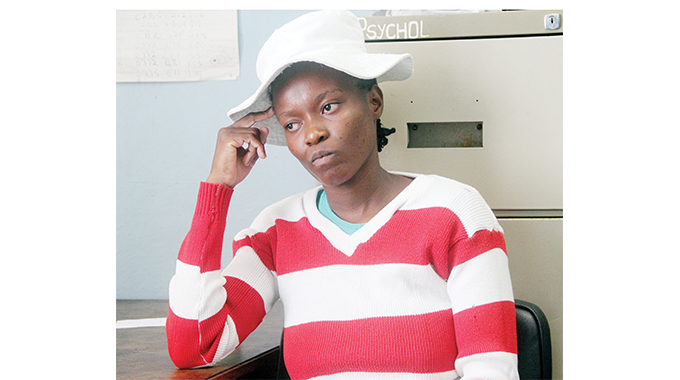Fear of darkness in the squalor of Sidojiwe Flats

Thandeka Moyo-Ndlovu, Health Reporter
SUNSET brings relief to most of Bulawayo residents and marks the end of the day’s toil reminding them of the need to go back home, rest and sleep with hope for a brighter tomorrow.
As many make their way to various bus stops to take the journey back home daily, the story is not the same for tenants at Sidojiwe Flats.
Whenever the sun sets, over 400 residents are forced to quickly get into their crowded, filthy spaces and hide from the emerging darkness which comes with security and safety fears.
Since they solely rely on the sun for light, they cannot afford to let the sun set before they have cooked and ticked other boxes on the to-do list for the day.
The urban slum has been condemned as unfit for human habitation countless times over the years.
It is home to a lost generation of children; some of them do not have birth certificates and do not attend school.
It is a haven for all kinds of crime and juvenile delinquency.
Social distancing is non-existent and the place has potential to be a super-spreader of the deadly Covid-19 virus that has killed millions around the world.
Most people who live there can barely make ends meet.
The block of flats in Sizinda close to Belmont industrial area were named after Prince Sidojiwe Khumalo – the son of the last Ndebele monarch, King Lobengula.
However, in the dilapidated lifeless building there is no reminder of anything royal and, in fact, it is a shameful reminder to its inhabitants of how poverty can strip humans of their dignity.
Sidojiwe was constructed in 1952 and formerly housed Cold Storage Commission (CSC) workers.
The residential area was condemned by the mayor Councillor Solomon Mguni on Wednesday as unsafe for human habitation.
He said the situation at Sidojiwe Flats was indeed dire, adding that efforts to decongest the building were in place.
Chronicle caught up with Ms Martha Mushindu, who said women remain the most affected and they are forced to bear double the burden that comes with staying at Sidojiwe.
She says besides the water and power challenges coupled with overcrowding; lack of privacy was among the top list of what depresses them.
For her, the issue of bathing in communal bathrooms with no windows or doors is dehumanising and robs women of their time to freely bathe without fear of Peeping Toms or sexual harassment.
Ms Mushindu says one tiny room accommodates up to 12 people from different families.
This means those who are married cannot fully enjoy their conjugal rights in the presence of their children and other families.
“I cannot even begin sharing our sorrows because to start with we owe the council more than $1 000 000 in arrears but we cannot afford to leave this place, it’s all we have.
“We live in total darkness but we are at least grateful for the sun which enables us to do a number of things before we shut ourselves into our small spaces whenever the sun sets,” she said.
“We have hundreds of challenges. We often think it will be impossible for anyone to save us from this suffering.
“We cannot live normal lives because so much is not right in this place.”
Close to Ms Mushindu’s heart are the children who spend most of their time playing as they cannot go to school.
Besides issues of financial resources, they do not have birth certificates which means their existence is also not accounted for.
“It pains me to see them grow in this environment where they sometimes witness things they are not supposed to see because they are young. Because there is no privacy, some have even witnessed their neighbours or parents making love, which breaks my heart because soon, they start practising that,” she said.
“We also have issues with teenage pregnancies that could be fueled by this set up, but my greatest fear is we are breeding a lost generation who will not even have a decent education to break away from these chains of poverty.”
Ms Mushindu adds that despite public claims that they are being helped by council, there was nothing that had been done.
Cllr Mguni told a United Nations delegation that toured Sidojiwe on Wednesday that council has made efforts to relocate people from Sidojiwe to the Cowdray Park Hlalani Kuhle project.
“Council has allocated these residents 120 stands and efforts will be made to accommodate more residents who are interested in the scheme. As a city, we continue to ensure that our residents have safe accommodation,” he said.
One of the youths, Miss Ntombikayise Nyathi, said the squalor and dirt at Sidojiwe has to be seen to be believed.
She said the rooms, built to cater for one or two people are being occupied by about 12 people.
“Plumbing is always broken as the infrastructure is old, our hygiene is compromised. Domestic violence is rife and children are exposed to this daily,” she said.
“Access to electricity is minimal; life is unbearable; some residents last accessed power last year in September.”
The International Organisation for Migration communications specialist Ms Fadzai Nyamande Pangeti, who was part of the UN delegation, said it is important for people like Sidojiwe residents to be able to access their rights despite challenges.
“We are here with other UN bodies to see that there is coordinated protection, promotion and enforcement of human rights for citizens and other vulnerable groups including internally displaced persons in Zimbabwe,” she said.
“We are seeing that these residents are vulnerable and exposed to many safety issues. Our main aim therefore is to try to empower them to claim their rights and be able to approach the council or whoever is responsible and raise their concerns with service delivery issues.” — @thamamoe










Comments